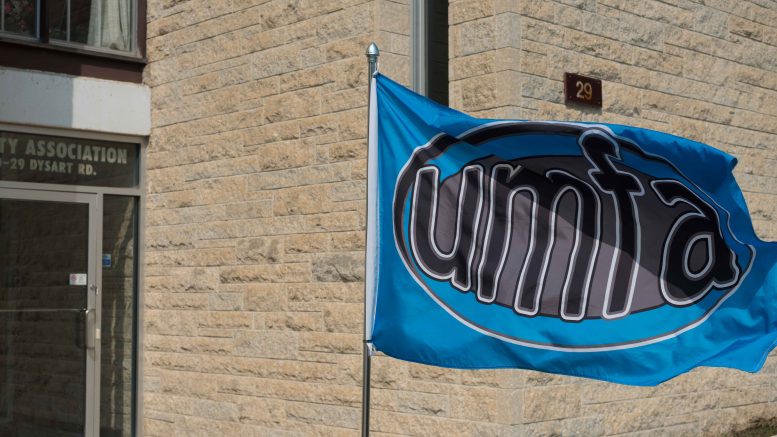The University of Manitoba Faculty Association (UMFA) is held a special general meeting Tuesday to discuss the most recent offer from U of M administration toward a long-term agreement.
The university presented the association of professors, researchers, and librarians with a four-year settlement offer on Sept. 13 that includes a general salary increase of seven per cent across the term of contract.
In addition to the existing annual increases and proposed salary bumps that address specific areas of need, the average UMFA member’s salary increase will be closer to 17.5 per cent, according to a university release.
The additional increases include adjustments to academic ranks that are currently below the national average for similar universities and disciplines with specific competitive contexts.
The offer also seeks to address job security, fair performance assessments, and improved benefits.
U of M administration chief negotiator Gregory Juliano claimed in the release that he is confident the package is attractive and responsive to UMFA’s positions.
However, UMFA president Mark Hudson said the union’s negotiation team signalled the two sides are still far apart on key issues.
“We haven’t even had a chance to talk to our members about it,” he said, noting the association was still awaiting a response from the administration on critical issues when some details of the offer were published on the university’s online communication arm, UM Today, last week.
“We’re disappointed that the university moved out of the gates as fast as it did to go public,” said Hudson, who would not comment on where the agreement appears to fall short of the association’s expectations.
“We’re at kind of a delicate stage in negotiations, I think, and it probably wasn’t helpful to put it all out in public – especially when we haven’t had a chance to discharge our duty of talking to our members and getting their feedback on the proposals,” he said.
The university’s executive director of public affairs, John Danakas, said the administration will not elaborate further on the details of the package, saying “out of respect for the bargaining process, the university won’t be commenting beyond the information that’s been shared on the website.”
The initial release said the settlement offer would be published in full on Friday, Sept. 30. However, after meeting with UMFA negotiators earlier that morning, the university agreed not to post the entire offer “with the intent of supporting positive future negotiations at the bargaining table.”
Comprehensive settlement offer
At the outset of bargaining, which began in earnest in late May, Hudson said a priority for UMFA is to see U of M salaries climb from among the bottom of the top 15 Canadian research universities, known as the U15.
The offer tabled will bring full and associate professors to 12th among the U15. Assistant professors will land at 13th.
The proposal would bring full professors’ base pay to $153,237 for the 2016-17 school year, according to numbers published online by the university. Associate professors would receive $117,364 and assistants $92,321.
Over the four-year tenure, the general salary increase would be one per cent the first year, followed by two per cent annually for the remaining three years.
Professors at the U of M were paid a minimum of $101,423 in the 2014-15 fiscal year. Associate professors earned a minimum of $82,599 and assistant professors a minimum of $70,370.
At the University of Alberta, professors made a minimum of $116,473 annually in 2014-15. Associate professors made a minimum of $93,944, while assistant professors a minimum of $75,403.
University of Saskatchewan professors earned a minimum of $124,618 in 2014-15, while associate and assistant professors made minimum salaries of $106,708 and $88,798, respectively.
The university offer also includes a commitment to a fair work evaluation framework that will prevent performance assessments based on formulas and quantitative metrics. The offer also commits to improving collegial processes regarding the assignment of teaching, promotion, and tenure.
Benefits, including maternity and parental leave, orthodontic coverage, drug coverage, and health care spending accounts would also be enhanced.
Bargaining timeline
The most recent contract between UMFA and the university – which covered 2013-16 and increased salaries 6.9 per cent over the term – expired at the end of March.
In the throes of a provincial election and uncertainty surrounding who would hold office following April’s vote, the university forwarded a one-year, salary-only offer that included a 1.5 per cent base increase. Including annual increases and additional adjustments based on rank and discipline, the average actual increase would have been closer to 3.94 per cent for the 2016-2017 contract year.
Looking for a longer-term deal that addressed outstanding governance issues, UMFA rejected the deal and full-scale bargaining began at the end of May with the goal of reaching an agreement before classes resumed in September.
The two sides met for at least 20 bargaining sessions over the summer break but an agreement was not reached and discussions continued throughout September.
The most recent offer was presented to UMFA Sept. 13 and published in part on UM Today Sept. 28.


